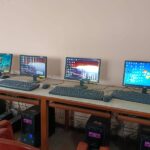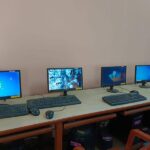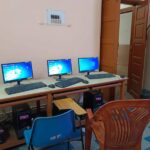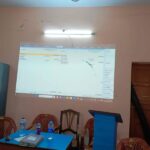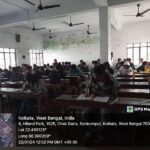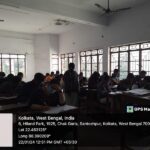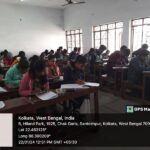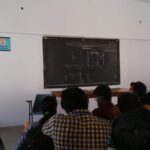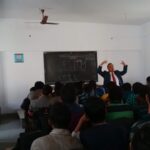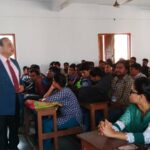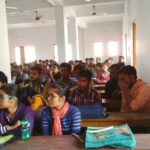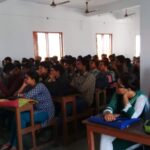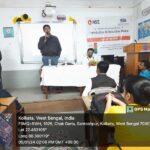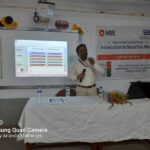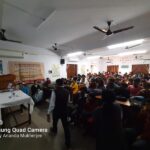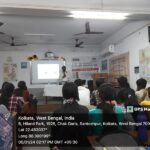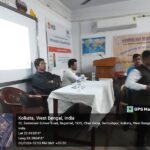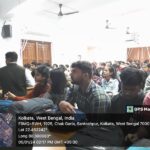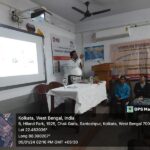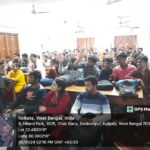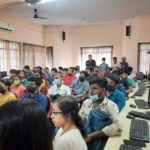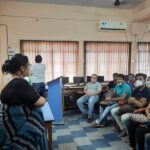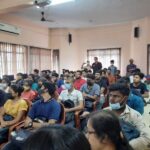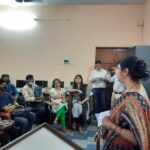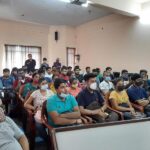- About the Department
- Faculty Profile
- Courses Offered
- PO and CO
- Teaching-learning
- Result and Student Progression
- Departmental Activities and Achievements
- Collaborative activities under MoU
- Photo Gallery
- The Department of Commerce is as old as the College. It had a humble beginning in 1997 with a single student enrolled in B. Com. (Pass) programme. B. Com. Honours programme was introduced in the following year. In keeping with the policy of decentralisation and participation followed by the College, rotational headship was introduced for the first time in the College in the Department in 2006. The faculty members regularly participate in college administration as convenors/members of College sub-committees. The Department also has a continuous representation in the Governing Body of the College.
- The Department currently has around 500 students, four full-time teachers and five State Aided College Teachers (SACT). Four teachers have Ph.D. degrees and two are currently pursuing Ph.D.Some of the teachers have presented papers in state level, national and international seminars and have publications in national, international and other ISSN journals. They also regularly participate in syllabus workshops/faculty development programmes and undertake Calcutta University assignments diligently.
- There are two modern computer laboratories with net connection in both of them and LCD projection system in one; the department having around 35 computers. Academic seminars as well as career-oriented ones are arranged from time to time. The Department is the pioneer in the College to haveoffered internship for its students since 2020. Semester VI students get practical training in computerised accounting and e-filing of tax returns from the Institute of Computer Accountants (ICA) and can do internship there. Induction tests for new entrants in the first year are conductedafter the commencement of every academic session. A departmental library is also maintained. There has always been a healthy student-teacher relation in the Department. Several students achieve good performance in the University examinations and every year, there are first classes among the graduated students. The Department of Commerce was the first in the College to appoint one of its alumni to teach as a guest lecturer way back in 2004.
- The Department strives to maintain and uphold its rich tradition of imparting quality education.

Dr. Ananda Mukherjee
Designation: Associate Professor
Email: anand-10@hotmail.com
Phone Number: 9831101380Get Detail »

Sri. Uttam Kumar Ghosh

Dr. Srikanta Malakar
Designation: Associate Professor
Email: malakar_srikanta@yahoo.com
Phone Number: 9477180684Get Detail »

Dr. Chandrani Dutta
Designation: Assistant Professor
Email: chandrani.dutta84@gmail.com
Phone Number:Get Detail »
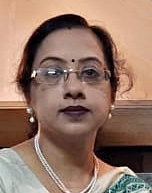
Dr. Oindrila Bannerjee
Designation: State Aided College Teacher
Email: oirini@gmail.com
Phone Number: 8583063123Get Detail »

Sri. Suvankar Mandal
Designation: State Aided College Teacher
Email: suvankarmandal2022@gmail.com
Phone Number: 9874381086Get Detail »

Sri Anjan Dutta
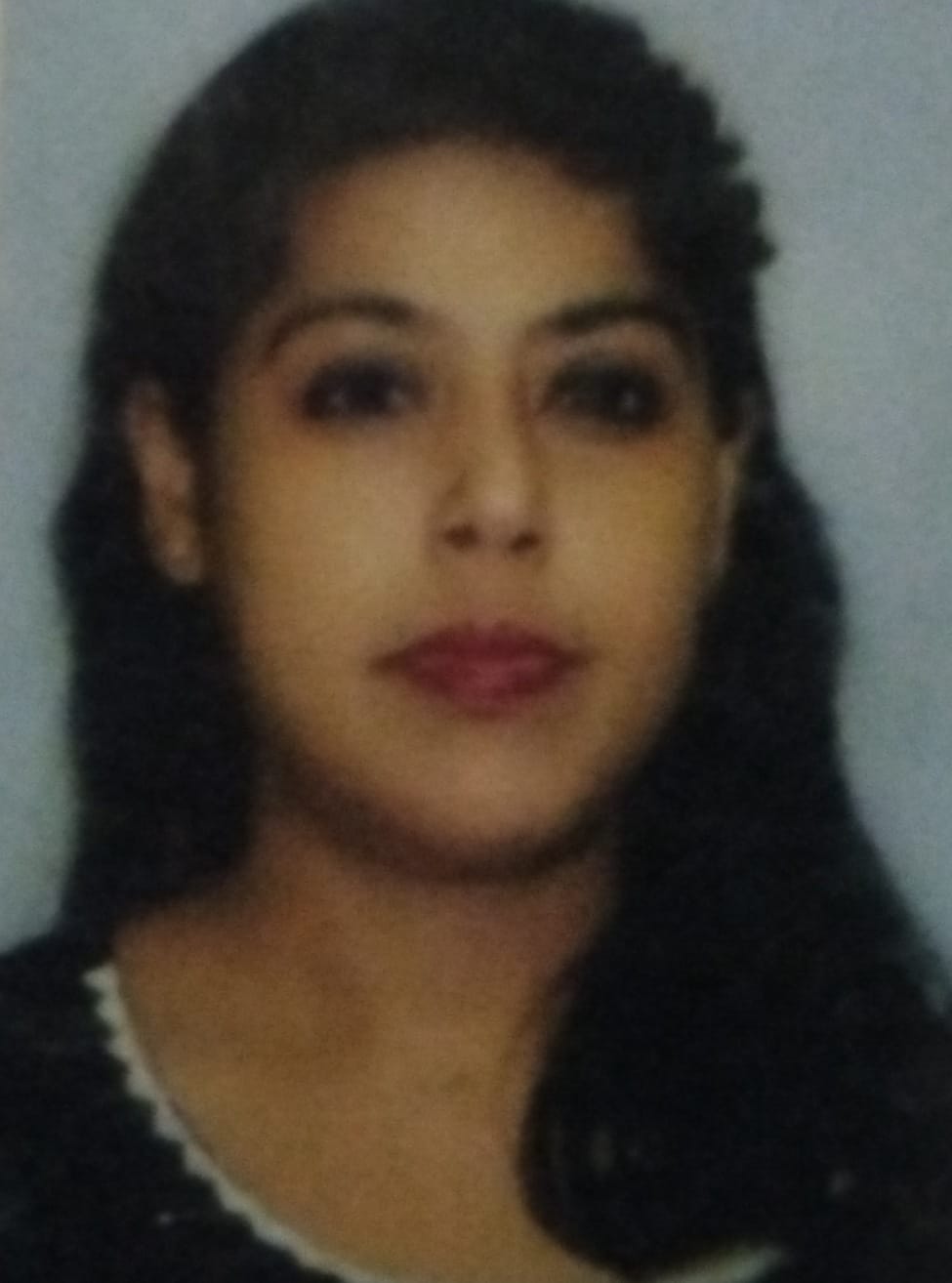
Smt. Sharmistha Sur
Designation: State Aided College Teacher
Email: psharui_raya@yahoo.com
Phone Number: 8240862795Get Detail »

Smt. Keya Saha
THE REGULATION FOR B.COM. (HONOURS AND GENERAL) 3-YEAR DEGREE PROGRAMME
[CHOICE BASED CREDIT SYSTEM (CBCS)]
B. Com. (Honours)
| Marks | Credit Hours | |||
| Ability Enhancement Compulsory Course (AECC) | Two Papers | 200 | 2 x 2 = 4 | |
| Skill Enhancement Elective Course (SEC) | Two Papers | 200 | 2×4 = 8 | |
| Generic Elective (GE) | Four Papers | 400 | 4 x 6 = 24 | |
| CORE COURSE (CC) | Fourteen Papers | 1400 | 14x 6 = 84 | |
| Discipline Specific Elective (DSE) | Four Papers | 400 | 4 x 6 = 24 | |
| 2600 |
Total 144 |
B. Com. (General)
| Marks | Credit Hours | |||
| Ability Enhancement Compulsory Course (AECC) | Two Papers | 200 | 2 x 2 = 04 | |
|
Skill Enhancement Elective Course (SEC) |
Two Papers | 200 | 2×4 = 08 | |
| Generic Elective (GE) | Four Papers | 400 | 4 x 6 = 24 | |
| Core Course (CC) | Eleven Papers | 1100 | 11 x 6 =66 | |
|
Discipline Specific Elective (DSE) |
Four Papers | 400 | 4 x 6 = 24 | |
| 2300 | Total 126 |
| Course | Name |
| CHG | Common Paper for Honours and General Courses |
| CH |
Common Paper for Honours Course irrespective of Discipline Specific Elective Papers opted for |
| CG | Common Paper for General Course irrespective of Discipline Specific Elective Papers opted for |
| DSE |
Discipline Specific Elective Papers |
A) Course Structure for B.Com. (Honours) under CBCS
Year I: Semester I
| Marks | Credit Hours | |||
| AECC 1.1Chg |
Language: Communicative English – 50 Indian Language – 50 |
100 | 2 | |
| GE 1.1Chg |
Microeconomics I & Statistics (50+50) |
100 | 6 | |
| CC 1.1 Chg | Business Laws | 100 | 6 | |
| CC 1.2 Chg | Principles of Management | 100 | 6 | |
| CC 1.1Ch | Financial Accounting – I | 100 | 6 |
Year 1: Semester II
| Marks | Credit Hours | |||
| GE 2.1Chg |
E-Commerce & Business Communication (50+50) |
100 | 6 | |
| CC2.1Chg | Company Law | 100 | 6 | |
| CC2.2Chg |
Marketing Management and Human Resource Management (50+50) |
100 | 6 | |
| CC 2.1Ch |
Cost and Management Accounting – I |
100 | 6 |
Year 2: Semester III
| Marks | Credit Hours | |||
| SEC3.1 Chg |
Information Technology & Its Application in Business (Theory -50 + Practical- 50) |
100 | 4 | |
| GE 3.1Chg |
Business Mathematics & Statistics (50+50) |
100 | 6 | |
| CC3.1 Ch | Financial Accounting II | 100 | 6 | |
| CC3.2Ch | Indian Financial System | 100 | 6 | |
Year 2: Semester IV
| Marks | Credit Hours | |||
| GE 4.1 Chg |
Microeconomics II & Indian Economy (50+50) |
100 | 6 | |
| CC4.1Chg |
Entrepreneurship Development and Business Ethics (50+50) |
100 | 6 | |
| CC 4.1Ch | Taxation I | 100 | 6 | |
| CC 4.2 Ch |
Cost and Management Accounting -II |
100 | 6 |
Year 3: Semester V
| Marks | Credit Hours | |||
| CC 5.1Ch | Auditing & Assurance | 100 | 6 | |
| CC 5.2 Ch | Taxation II | 100 | 6 | |
| DSE 5.1 A* |
Macroeconomics and Advanced Business Mathematics (50+50) |
100 | 6 | |
| DSE 5.2 A* | Corporate Accounting | 100 | 6 |
Options:
*Or DSE 5.1 M (Consumer Behaviour and Sales Management -50+50)
& DSE 5.2 M (Product & Pricing Management and Marketing Communication (50+50)
*Or DSE 5.1T(Public Finance and Taxation) & DSE 5.2 T (Direct Tax: Laws and Practice)
*Or DSE 5.1 e-B (Fundamentals of Computer )
& DSE 5.2 e-B DBMS and System Analysis &Design (50+50)
Year 3: Semester VI
| Marks | Credit Hours | |||
| AECC 6.1Chg | Environmental Studies | 100 | 2 | |
| SEC6.1Chg |
Computerised Accounting and e-Filing of Tax Returns |
100 | 4 | |
| CC 6.1Ch | Project Work | 100 | 6 | |
| DSE 6.1 A** |
Financial Reporting and Financial Statement Analysis |
100 | 6 | |
| DSE 6.2 A** | Financial Management | 100 | 6 |
Chg: Common for Honours and General; Ch: Core Course for Honours
Options:
**Or DSE 6.1 M (Retail Management and Marketing of Services (50+50) & DSE 6.2 M (Rural Marketing and International Marketing (50+50)
**Or DSE 6.1 T (Indirect Tax: Laws and Practices) & DSE 6.2 T (Tax Procedures and Planning)
**Or DSE 6.1 e-B (Internet & WWW and Functional e-Business System (50+50) & DSE 6.2 e-B(Computer Applications and e-Business Applications – Practical (50+50)
B) Course Structure for B.Com. (General) under CBCS
Year I: Semester I
| Marks | Credit Hours | |||
| AECC 1.1Chg |
Language: Communicative English – 50 Indian Language – 50 |
100 | 2 | |
| GE 1.1 Chg |
Microeconomics I & Statistics (50+50) |
100 | 6 | |
| CC 1.1 Chg | Business Laws | 100 | 6 | |
| CC 1.2 Chg | Principles of Management | 100 | 6 | |
| CC 1.1 Cg | Financial Accounting – I | 100 | 6 |
Year 1: Semester II
| Marks | Credit Hours | |||
| GE 2.1 Chg |
E-Commerce & Business Communication (50+50) |
100 | 6 | |
| CC 2.1 Chg | Company Law | 100 | 6 | |
| CC 2.2 Chg |
Marketing Management & Human Resource Management (50+50) |
100 | 6 | |
| CC 2.1Cg |
Cost and Management Accounting I |
100 | 6 |
Year 2: Semester III
| Marks | Credit Hours | |||
| SEC 3.1 Chg |
Information Technology & Its Application in Business (Theory -50 + Practical- 50) |
100 | 4 | |
| GE 3.1 Chg |
Business Mathematics & Statistics (50+50) |
100 | 6 | |
| CC 3.1 Cg | Financial Accounting II | 100 | 6 |
Year 2: Semester IV
| Marks | Credit Hours | |||
| GE 4.1 Chg |
Microeconomics II & Indian Economy (50+50) |
100 | 6 | |
| CC 4.1 Chg |
Entrepreneurship Development and Business Ethics (50+50) |
100 | 6 | |
| CC 4.1 Cg | Taxation I | 100 | 6 | |
| CC 4.2 Cg |
Cost and Management Accounting -II |
100 | 6 |
Year 3: Semester V
| Marks | Credit Hours | |||
| CC 5.1 Cg | Auditing & Assurance | 100 | 6 | |
| DSE 5.1 A* | Taxation II | 100 | 6 | |
| DSE 5.2 A* | Corporate Accounting | 100 | 6 |
Options:
*Or DSE 5.1 M (Consumer Behaviour and Sales Management -50+50)
& DSE 5.2 M (Product & Pricing Management and Marketing Communication (50+50)
*Or DSE 5.1T (Public Finance and Taxation) & DSE 5.2 T (Direct Tax: Laws and Practice)
*Or DSE 5.1 e-B (Fundamentals of Computer )
& DSE 5.2 e-B DBMS and System Analysis &Design (50+50)
Year 3: Semester VI
| Marks | Credit Hours | |||
| AECC 6.1 Chg | Environmental Studies | 100 | 2 | |
| SEC 6.1 Chg |
Computerised Accounting and e-Filing of Tax Returns |
100 | 4 | |
| DSE 6.1 A** |
Financial Reporting and Financial Statement Analysis |
100 | 6 | |
| DSE 6.2 A** | Financial Management | 100 | 6 | |
18
Chg: Common for Honours and General; Cg: Core Course for General
Options:
**Or DSE 6.1 M (Retail Management and Marketing of Services (50+50) & DSE 6.2 M (Rural Marketing and International Marketing (50+50)
**Or DSE 6.1 T (Indirect Tax: Laws and Practices) & DSE 6.2 T (Tax Procedures and Planning)
**Or DSE 6.1 e-B (Internet & WWW and Functional e-Business System (50+50) & DSE 6.2 e-B(Computer Applications and e-Business Applications – Practical (50+50)
UNIVERSITY OF CALCUTTA
Syllabi for Semester 1 & 2 of B.Com. 4-year Programme and B.Com. (MDC) 3-year Programme
Under NEP-2020 (effective from the Academic Session 2023-24)
Semester 1 Major Paper 1
Financial Accounting I
Credit of the Paper 4
Semester-end Examinations: 75 marks Tutorial Examinations: 25 marks Total: 100 marks
| Unit | Topic | Details |
| 1 | Introduction |
· Nature of accounting; Users of accounting information; Qualitative characteristics of accounting information. · Double entry book keeping system – Basic accounting equation, meaning of assets, liabilities, equity, revenue and expenses. Accounting Cycle – Recording of transaction: Journal, Ledger and preparation of Trial Balance. · Bases of accounting; cash basis and accrual basis. · Basic concepts and conventions: entity, money measurement, going concern, cost, realisation, accruals, periodicity, consistency, prudence (conservatism), materiality, matching and full disclosures. |
| 2 | Concepts for determination of business income |
· Concept of revenue recognition and recognition of expenses. · Inventories: meaning. Significance of inventory valuation. Lower of cost or market rule; Inventory ascertainment and reconciliation. |
|
· The nature of depreciation. The accounting concept of depreciation. Factors in the measurement of depreciation. Methods of computing depreciation: straight line method, diminishing balance and Units of production method; Disposal of depreciable assets; change in estimate and method of charging depreciation. Accounting for depreciation: Asset-depreciation, Asset-provision. · Reserves and provisions: Meaning; Objective; Types & Accounting |
||
|
· Capital and revenue expenditures and receipts: general introduction only. · Adjustment (including goods with customers pending approval) and rectification entry |
| 3 | Final accounts of Trading Concern | Preparation of financial statements: of sole proprietorship business entities from a trial balance – Manufacturing, Trading, Profit & Loss Account and Balance Sheet |
| 4 | Financial statements of Not for Profit organisations and from Incomplete records |
Preparation of Receipts & Payments A/c, Income & Expenditure A/c and Balance Sheet Transaction approach |
| 5 | Sectional and Self-balancing ledger | · Concept of sectional balancing, preparation of control accounts. Self-balancing Ledger: advantages; Recording process; preparation of Adjustment accounts. |
Relevant Accounting Standards issued by the Institute of Chartered Accountants of India are to be followed.
Suggested Reading:
- Basic Accounting, Rajni Sofat & Preeti Hiro, PHI
- Sukla, Grewal, Gupta: Advanced Accountancy I, S Chand
- L.Gupta & Radheswamy, Advanced Accountancy Vol. I, S. Chand
- Maheshwari & Maheshwari, Advanced Accountancy I, Vikash Publishing House Pvt. Ltd.
- Sehgal & Sehgal, Advanced Accountancy I, Taxman Publication
- Hanif & Mukherjee, Financial Accounting, TMH
- Frank Wood, Business Accounting Vol 1, Pearson
- Tulsian, Financial Accounting, Pearson
- Mukherjee and Mukherjee, Financial Accounting I, Oxford
- Accounting Standards issued by ICAI
- Amitava Basu & Sibasish Datta, Financial Accounting I, Tee Dee Ltd.
- Debarshi Bhattacharya (Ratul), Financial Accounting I, Law Point
Semester 1 Minor Paper 1
Principles and Practice of Management
Credit of the Paper 4
Semester-end Examinations: 75 marks Tutorial Examinations: 25 marks Total: 100 marks
Unit-1: Introduction:
Management-definition, importance, functions, levels of management, managerial tasks and skills, Management theories – Classical (Taylor & Fayol), Neo-classical (Elton mayo & Mary Parker Follet) and Modern School of
management (Peter Drucker & Michael Porter) Managerial roles (Mintzberg), Social Responsibility of Management and its significance
Unit-2: Planning:
Meaning, nature, purpose, types, premises, elements of planning and limitations of planning; Strategic planning- concept, process and importance, Decision Making – concept, importance; Environment analysis and SWOT analysis [concept and elements]
Unit-3: Organizing:
Concept, need, principles, steps in organising, different organization structure [line, staff, functional, project and new organisational structure – basic concepts] Departmentation-need, basis, Delegation of Authority-elements, principles; Centralization and Decentralization of Authority; Span of Management; concept and factors determining span of management
Unit-4: Directing and Leadership:
Directing: concepts, elements and importance; Leadership: Concept, importance, types, Major theories of Leadership (Likert’s system four theory, Blake and Mouton’s Managerial Grid theory, Fred Fiedler’s situational leadership, Tannenbaum & Schmidt’s Behavioural Model, Trait theory of leadership)
Unit- 5: Motivation, Co-ordination and Control:
Motivation: Concept, steps, importance, Motivation theories: Maslow’s Need-Hierarchy theory, Herzberg’s Two- factor theory and McGregor’s theory of X and Y;.
Coordination: concepts, importance, principles; Control: concepts, importance and Managerial tools of control.
Suggested Readings
- Kaul, K., Business Management, Vikash
- Koontz & Weirich, Essentials of Management, TMH
- Principles of Management, Meenakshi Gupta, PHI
- Stoner & Freeman, Management , PHI
- Drucker, F., Managing Challenges for the 21st Century, Butterworth, Oxford
- Mitra, K., Principles of Management, Oxford
- Debnath K, & Dutta S.P., Principles and Practice of Management, Tee Dee Pub. (P) Ltd.
- Kaul Vijay Kumar, Business Management, Vikas Publishing House
Semester 1 Inter-Disciplinary/Multi-Disciplinary (IDC/MDC) Paper 1
Microeconomics
Credit of the Paper 3
Semester-end Examinations: 50 marks Tutorial Examinations: 25 marks Total: 75 marks
Unit-I: Introduction –Definition of Microeconomics, Macroeconomics–positive and normative economics–Basic concepts–scarcity and choice–Production Possibility Curve–Central Problem of the Economy–concept of slope
Unit-II: Theory of Demand and Supply
- Demand and Supply–Concepts of Demand-derived demand–Demand function–Determinants of demand — Law of Demand & its expectations–Movement along the Demand curve and shift of the Demand curve– Concepts of Supply and Supply function–Law of Supply –Movement along the supply curve and shift of the supply curve–Market equilibrium and Determination of price–Effect of change in the Demand and Supply on Equilibrium price
- Elasticity of Demand and Supply– Price elasticity of demand –Determinants and Measurement of price elasticity–Relationship between slope and price elasticity of demand–Income elasticity of demand–Cross price Elasticity of Demand –Elasticity of Supply
Unit III: Theory of Consumer Behaviour—Concept of Utility and Marginal utility–The Law of Diminishing marginal Utility–Cardinal Utility theory-Concept and significance of Consumer Surplus–Consumer’s Equilibrium in case of single and two commodities–Concept of Ordinal utility theory–Indifference curve and its properties– Marginal Rate of Substitution–Budget Line and Budget equation–Consumer’s Equilibrium
Unit IV: Theory of Production and Cost– Concept of Production Function–Fixed and Variable inputs–Short run and Long run–Relation among Total, Average and Marginal Product–Law of Variable Proportion–Return to Scale–Isoquants, Isocosts and Producer’s equilibrium (Graphical Explanation)–Concepts of Economic Cost and Opportunity Cost–Short Run and Long run Cost Functions–Relation among Average Cost, Average Variable Cost and Marginal Cost–Long run Average Cost Curve from Short Run Average Cost curves
Unit V: Revenue and Market— Definition and different forms of Market–Revenue under Different Market Structure–Relation among Total Revenue, Average revenue and Marginal Revenue–Perfect Competition and Monopoly–Features, Equilibrium of the firm ( Short Run and Long Run)–Short run supply curve of a firm under perfect competition–Price discrimination under monopoly–concepts and conditions
Suggested readings
- Microeconomics, Mukherjee Sampat, Mukherjee Mallinath & Ghosh Amitava, PHI
- Pindyck R and Rubinfeld L, Micro Economics, Pearson
- Gould & Ferguson, Micro Economic Theory
- N.G., Principles of Microeconomics, Cengage
- Dasgupta P and Khan P, Microeconomics and Statistics, Elegant Publication
- Bhattacharyya S, Microeconomics and Indian Economics, Oxford University Press
- Majumdar D and Banerjee A, Microeconomics and Statistics, ABS Publishing House
- Dwivedi, N., Managerial Economics, Vikash Publications
- Sarkhel J, Salim S and Dutta S, Microeconomics and Statistics, Book Syndicate
- De Bipul, Microeconomics, Tee Dee Publications (P) (Bengali & English Version)
- Jana Dipparna, Microeconomics 1, Law Point
Semester 1 SKILL ENHANCEMENT COURSE (SEC) Paper 1
Entrepreneurship Development
Credit of the Paper 4 Semester-end Examinations: 75 marks Tutorial Examinations: 25 marks
Total 100 marks
Unit-1:
Entrepreneur: meaning, features, functions and different types (Innovative, imitating, fabian, drone, social, intrapreneur, technopreneur, ecopreneur) ;Entrepreneurship Meaning, elements, determinants and importance; need for creativity and innovation in Entrepreneurship; Role of family business in India; The contemporary role models in Indian business [including Women Entrepreneur]: their values, business philosophy and behavioural orientations; Conflict in family business and its resolution.
Unit-2:
Public and private system of stimulation, support and sustainability of entrepreneurship, requirement, availability and access to finance, marketing assistance, technology, and industrial accommodation, Role of industries/entrepreneur’s associations and self-help groups, The concept, role and functions of business incubators, angel investors, venture capital and private equity fund.
Unit-3:
Sources of business ideas [concept and features] and tests of feasibility [concept and objective], innovation life cycle, creative process, Significance of writing the business plan/project proposal; Concept, importance and contents of business plan/project proposal; Designing business processes, location, layout, operation, planning & control; preparation of feasibility study report and project report [Unit to be studied along-with Case Studies as far as practicable]
Unit-4:
Mobilizing Resources for entrepreneurship, Need for finance in entrepreneurship; Micro, Small and Medium Enterprises: meaning, advantages and disadvantages; Start up: mobilizing resources for start-up: Accommodation and utilities; Preliminary contracts with the vendors, suppliers, bankers, principal customers, basic start up problems, methods to solve start up problems.
Suggested Readings:
- Kuratko and Rao, Entrepreneurship: A South Asian Perspective, Cengage
- Sharma, , Entrepreneurship Development, PHI
- Robert Hisrich, Michael Peters, Dean Shepherd, Entrepreneurship, McGraw-Hill Education
- Desai, Vasant. Dynamics of Entrepreneurial Development and Management. Mumbai, Himalaya Publishing
- Dollinger, Mare Entrepreneurship: Strategies and Resources. Illinois, Irwin.
- Holt, David Entrepreneurship: New Venture Creation. Prentice-Hall of India, New Delhi.
- Plsek, Paul Creativity, Innovation and Quality. (Eastern Economic Edition), New Delhi: Prentice-Hall of India. ISBN-81-203-1690-8.
- Singh, Nagendra Emerging Trends in Entrepreneurship Development. New Delhi: ASEED.
- SS Khanka, Entrepreneurial Development, Chand & Co, Delhi.
- K Ramachandran, Entrepreneurship Development, McGraw-Hill Education
- SIDBI Reports on Small Scale Industries
- Mukherjee & Roy, Entrepreneurship Development, Oxford
- Chandra B & Biswas B, Entrepreneurship Development, Tee Dee Pub (P) Ltd (Bengali & English Version)
Syllabi for AEC and VAC will be provided by the respective UGBOS
Semester 2 Major Paper 2
Cost Accounting I
Credit of the Paper 4 Semester-end Examinations: 75 marks Tutorial Examinations: 25 marks
Total 100 marks
| Unit | Topic | Contents |
| 1. | Introduction |
· Definition of Costing, Objectives of Cost Accounting; Installing a Cost Accounting System, Essentials of a good Cost Accounting System. · Cost concepts, terms and classification of costs: Cost, Cost object, Cost units and Cost Centres, Types of costs, classification of costs- Direct-Indirect, Elementwise, Functionwise, Behaviourwise, Sunk Cost, opportunity Cost, Incremental and Differential cost. Costing Methods and Techniques (introduction only). |
| 2 | Material Costs |
· Purchase of materials: Organisation, purchase procedure, documentation, determination of material purchase costs. · Storage of materials: Need for storage, location and types, functions of a storekeeper, requisition, receipt, issue and transfer of materials, storage record, accounting for materials cost. · Materials control: Organisation; Tools: Just-in-Time Purchase; various stock levels, Economic Ordering Quantity and ABC Analysis; Periodic Inventory, Perpetual Inventory, Physical verification; Discrepancies in stock and their treatment. · Methods of Pricing Material Issues: FIFO, LIFO, and Weighted Average. · Treatment of Normal and Abnormal Loss of Materials |
| 3 | Employee Cost and Incentive Systems |
· Introduction, Recordinglabour cost: Attendance and payroll procedures (Time-keeping, Time-Booking, Payroll procedure, Payment of wages-Piece rate, differential piece rate, time rate); Idle time (causes and treatment in Cost Accounting), Overtime (its effect and treatment in Cost Accounting), Labour turnover (Causes, impact and methods of calculating labour turnover). · Main Principles for sound system of wage incentive schemes, labour utilisation; System of Wage Payment and Incentives(Halsey, Halsey-weir, Rowan and Efficiency based ); Group Bonus scheme (simple) · System of Incentive Schemes for Indirect Workers; Component of wages cost for costing purpose. |
| 4 | Accounting for Overhead |
Overhead · Introduction: Definition, Classification of Overhead- Functional and Behavioural. · Manufacturing Overheads: Allocation and apportionment of Overhead; Absorption of Overhead: Blanket and Departmental rate; various methods of absorption and their applications; Under absorption/over absorption of overheads and their treatment. · Administration and Selling & Distribution Overheads and their charging. |
| 5 | Cost Statement | · Preparation of Cost Sheet, Single product and Multi-product, estimation and price quotation |
Suggested Readings
- Horngren, Foster, Datar, et al, Cost Accounting,- A Managerial Emphasis, Pearson
- Banerjee, Cost Accounting: Theory and Practice, PHI
- Drury, , Management and Cost Accounting, Cengage
- Jawahar Lal & Seema Srivastava, Cost Accounting, TMH
- Y. Khan & P.K. Jain, Management Accounting, TMH
- Atkinson, Management Accounting, Pearson
- Bhattacharyya, Ashish , Cost Accounting for Business Managers, Elsevier
- Ravi M Kishore, Cost and management Accounting, Taxmann
- Mitra, K., Cost & Management Accounting, Oxford
- Hanif, , Cost & Management Accounting, McGraw Hill
- Bhattacharya Debarshi, Cost & Management Accounting I, Law Point
Semester 2 Minor Paper 2
Marketing Management and Human Resource Management
Credit of the Paper 4 Semester-end Examinations: 75 marks Tutorial Examinations: 25 marks
Total 100 marks
Unit 1: Introduction
Module 1: Marketing Management Semester-end Examinations – 40 marks
| Meaning of market, Objectives and Importance of Marketing; Societal Marketing concept |
| Selling vs. Marketing; Marketing mix [concepts, components] |
| Marketing environment: concept, importance, and components. |
Unit 2: Market Segmentation
| Market segmentation: concept, importance and bases; Product differentiation vs. market segmentation. |
Unit 3: Product
| Concept and importance, Product classifications; Concept of product mix; |
| Branding-Concept, packaging and labeling; |
| Product life-cycle [concept], New Product Development Process. |
Unit 4: Pricing and Distribution
|
Pricing [Meaning, objectives, Significance and methods] Factors affecting price of a product. Pricing policies and strategies |
| Distribution Channels – meaning and importance; Types of distribution channels |
Unit 5: Promotion and Recent developments in marketing
| Promotion: Nature and importance of promotion; |
| Types of promotion: advertising, personal selling, publicity & sales promotion, |
| Recent developments in marketing: Social Marketing, online marketing, direct marketing, services marketing, green marketing, Rural marketing; Consumerism. |
Module 2: Human Resource Management
Semester-end Examinations – 35 marks
Unit 1: Nature and Scope
| Concept and meaning of HR, Understanding the Nature and Scope of HRM, |
| Functions and importance of HRM |
Unit 2: Human Resource Planning
| Definition, Need of Human Resource Planning, |
| Factors affecting Human Resource Planning. |
Unit 3: Recruitment and Selection
| Definition of Recruitment, Source, need and importance of Recruitment, |
| Recruitment Policy–process–sources of Recruitment Definition of Selection, Steps in selection. |
Unit 4: Training and Development
| Training and Development Meaning and purpose of training, |
| Benefits of training to organization and employees –Training methods. |
Unit 5: Job Evaluation and Performance Appraisal
| Job evaluation- objectives, scope, |
| Job analysis, Job description, Job Specification-basic concept and significance, |
| Performance Appraisal-Concept |
Suggested Readings:
- Kotler, , Marketing Management, Pearson
- Ramaswamy and Namakumari, Marketing Management, McMillan
- Marketing Management, Govindarajan, , PHI
- Principles of Marketing, Kapoor, , PHI
- Bhagwati, Pillai, Marketing Management, Chand
- Verma, Duggal, Haldar & Sarkar, Principles of Marketing, Oxford
- Samanta, S R, Human Resource Management, PHI
- Mahajan, Reeta, Human Resource Management, Vikash
- Haldar & Sarkar, Human Resource Management, Oxford
- Sinha, Sekhar & Bala, Human Resource Management, Cengage
- Jyothi & Venkatesh, Human Resource Management, Oxford
- Praharaj & Praharaj, Principle of Marketing and Human Resource Management, Tee Dee Pub (P) (Bengali & English Version)
- Ghosh Sudipta & Joshi Lalit Kumar, Marketing Management and Human Resource Management, Law Point
Semester 2Inter-Disciplinary / Multi-Disciplinary COURSE (IDC / MDC)Paper 2
Macroeconomics
Credit of the Paper 3
Semester-end Examinations: 50 marks Tutorial Examinations: 25 marks Total: 75 marks
Unit-I: Basic Concepts: Macroeconomics, Concepts, Scope, macroeconomic variables, objectives, Differences with microeconomics.
Unit-II: National Income: National income accounting, Concepts and measurement of GDP, GNP, NNP, NDP, PI, DPI, Circular flow of income (2 sectors & 3 sectors economy),Real and Nominal GDP and GDP Deflator.
Unit-III: Determination of equilibrium income in Simple Keynesian Model: Theory of Income determination- Simple Keynesian model; Consumption, Saving, Investment functions; National Income determination; Investment multiplier, Government expenditure multiplier (Graphical Analysis), Tax multiplier and Balanced budget multiplier (concepts).
Unit-IV: Money and inflation: Concept of demand for money and supply of money, Measures of supply of money, High powered money, money multiplier, Concept of Inflation, Demand pull and Cost push Inflation. Inflationary gap. Monetary and fiscal measures to control inflation.
Unit-V: Public Finance: Government budget-meaning and components, Classifications of receipts –revenue and capital receipts; Classification of expenditure-revenue and capital expenditure. Measures of Government deficit-Revenue deficit, Fiscal deficit, Primary deficit.
Suggested Readings:
- Branson H. Macro Economic Theory and Policy,
- Dornbusch, Fischer & Startz, Macroeconomics, TMH
- Samuelson & Nordhaus, Macroeconomics, McGraw Hill
- Ghosh C & Ghosh , Macroeconomics, PHI
- Parchure, Macroeconomics, PHI
- Bhattacharyya S and Das I, Macroeconomics and Advanced Business Mathematics, , Oxford University Press
- Majumdar D and Chatterjee N, Macroeconomics and Advanced Business Mathematics, ABS Publishing House
- Dasgupta P and Chakraborty G, Samashtigoto Orthoneeti O Uchhotoro Banijyik Gonit, Dey Book Concern
- De Bipul, Macroeconomics, Tee Dee Publications (P) (Bengali & English Version)
Semester 2 SKILL ENHANCEMENT COURSE (SEC) Paper 2
Information Technology and its Application in Business
Credit of the Paper 4
Semester-end Examinations (Theory): 50 marks Semester-end Practical Examinations: 50 marks Total: 100 marks
Unit 1: Fundamentals of Computer
Module I — Theory (50 Marks)
Components of a Computer System, Applications of Computers, Advantages and Disadvantages of Computers, Software and its Types: System Software, Application Software, Operating System, Mobile Operating System, Free and Open Software.
Unit 2: Internet Services & Security measure
Key technology concepts, Packet switching, TCP/IP, IP addresses, Types of Internet Services, World Wide Web (WWW), Uniform Resource Locator (URL), Domain Names, Web Browsers. Internet of Things: Concept, Smart Device, RFID and it’s use cases, Wireless Sensor Networks and it’s applications, Information Rights, Privacy and Freedom in an Information Society, Principles of Cyber Security, Computer Malwares, Well-known attacks (Fishing, Spoofing etc) and it’s prevention measures like CAPTCHA Code, Password etc. Use of Blockchain technique for security measures.
Unit 3: Current Computing Paradigm
Cloud Computing: Service Oriented approach, Virtualization, Business Model, Use cases, Green computing, Edge computing, Quantum computing, Challenge of Big Data
Unit 4: Business Data Handling
Transaction processing, Analytical processing-Concepts, Techniques, Difference, Concept of Data Mining including Text Mining and Web Mining, Evolution of AI, Importance of Artificial Intelligence in Business Data handling through use cases, Basic Concepts of an Expert system in context of Business Data Management, Basic concepts of Machine learning including supervised and unsupervised learning, Application of Machine learning in Banking and Finance, Basic concepts on ERP based Business Software Solutions. Intelligent Agents (Concepts & Application).
Unit 5: IT Act 2000 and Cyber Crimes
IT Act 2000(as amended thereon)- Definitions of different terms, Digital signature, Electronic Governance, Attribution, Acknowledgement and Dispatch of Electronic Records, Regulation of Certifying Authorities, Digital Signatures Certificates, Duties of Subscribers, Penalties and Adjudication, Appellate Tribunal, Offences and Cyber-crimes.
Module II — Practical (50 Marks)
| Unit No. | Unit Name | Topics |
| 1 | Word processing | Introduction: Creating and saving your document, displaying different views, working with styles and character formatting, working with paragraph formatting techniques using indents, tabs, alignment, spacing, bullets and numbering and creating borders; Page setup and sections: Setting page margins, orientation, headers and footers, end notes and foot notes, creating section breaks and page borders; Working with tables: Creating tables, modifying table layout and design, sorting, inserting graphics in a table, table math, converting text to table and vice versa; Create newspaper columns, indexes and table of contents, Spell check your document using inbuilt and custom dictionaries, checking grammar and style , using thesaurus and finding and replacing text; Create bookmarks, captions and cross referencing, adding hyperlinks, adding sources and compiling and bibliography; Mail merge: Creating and editing your main document and data source, sorting and filtering merged documents and using merge instructions like ask, fill-in and if-then-else; Linking and embedding to keep things together. (Creating Business Documents using the above facilities; Hands-on experience in using spreadsheet software |
| 2 | Spreadsheet | Working with cell and cell addresses, entering and editing data, finding and replacing data, selecting a range, moving, cutting, copying with paste, inserting and deleting cells, freezing cells, cell formatting options, adding, deleting and copying worksheet with in a workbook, renaming a worksheet, Cell reference – relative, absolute – Elements of spreadsheet charts – categories, create a chart, choosing chart type, edit chart axis, titles, labels, data series and legend, adding a text box, rotate text in a chart. Hands-on experience in using spreadsheet software . |
| 3 | Presentation | Introduction, creating presentations – using auto content wizard, using templates, using blank presentation, formatting background, adding sounds, slide show, slide sorter, setting animation, slide transaction, setting intervals, saving and printing, presentations, adding and playing audio clips in presentations, creating hyperlinks in presentations, converting the presentations into a video clip, Morph Transition. (Creating Business Presentations using above facilities). Creating professional presentations using software. |
Suggested Readings
- Introduction to Computer Application (As per NEP) by Ashok [S. Chand and Co. Ltd.]
- Fundamentals of Computers by Reema Thareja: Oxford Publisher
- Computer Fundamentals by Pradeep K Sinha; BPB Publication
- Experiencing MIS by Kroenke and [Pearson]
- Essentials of MIS by Laudon & [Pearson, 14th Edition]
- New Perspectives Microsoft® Office 365® & Office 2019 Introductory by Patrick Carey, Dan Oja, June Jamrich Parsons, Katherine T. Pinard, Ann Shaffer, Mark Shellman [Cengage]
- Information Technology and its Application in Business, S Dawn and P Banerjee, Tee Dee Ltd.
- Introduction to Computer Application, Ashok Arora, Vikas Publishing House,
- Computer Applications -1, Anirban Das & Shantanu Chakraborty, Law Point
- Computer Applications in Business, Deepak Jain, Law Point
Syllabi for AEC and VAC will be provided by the respective UGBOS
PROGRAMME SPECIFIC OUTCOMES (PSO) IN COMMERCE STREAM
We know that B.Com. is an undergraduate programme offering Four Year Honours with Research/without Research and Three Year Multidisciplinary options under the Credit and Curriculum Framework (CCF) of the New Education Policy (NEP). The Four Year Honours with Research/without Research option is meant for advanced level students who aim either for higher studies/professional studies or for research in commerce or allied fields. The Three Year Multidisciplinary option is suitable for those students who are academically not that much advanced as well as for those who prefer to get jobs rather than going for higher studies.
The B.Com. programme of the University of Calcutta deals with the study of accounting and finance, economics, business policy and ethics, corporate management and governance, business laws, taxation, etc. Hence students pursuing B. Com. have a golden chance to get jobs in a wide variety of business and industry, and to become entrepreneurs as well.
They have, in particular, the following opportunities:
- PO-01: Students of this course acquire the fundamental knowledge on an array of subjects like accounting, finance, auditing, taxation, economics, management, business communication, business laws, entrepreneurship, economics, business ethics, applications of mathematics and statistics in business and commerce, marketing, human resource, e-commerce, basics of information technology, etc.
With this background, a student can either pursue higher studies (post-graduation and research) to become an academician, or can opt for statutory professions like chartered accountancy or company secretaryship, or even become a business entrepreneur.
- PO-02: Many Commerce students take up professional courses like chartered accountancy (CA), company secretaryship (CS), or cost and management accountancy(CMA). There is a high demand for such professionals in the country both in the corporate as well as non-corporate sector. Moreover, acquiring these qualifications, opens up the prospect for independent practice.
- PO-03: Commerce graduates can also pursue globally recognized and reputed overseas professional courses like CMA from the UK, ACCA and CA from the UK, and CPA and CFA from the USA.
- PO-04: A large number of Commerce graduates opt for Business Management or Business Administration (MBA) courses to acquire coveted knowledge and skill for entering managerial jobs with good pay in the corporate sector.
- PO-05: A career in Law in general and Company Law in particular, is also quite a promising option for Commerce graduates.
- PO-06: Only commerce graduates can apply for entering specialized government jobs as gazetted officers in central or state Audit and Accounts Services.
- PO-07: Conceptual understanding of the underpinnings of financial and cost accounts, financial management, direct and indirect tax system, company law provisions, auditing procedure, statistical applications, and marketing concepts help to acquire the practical skills to work as tax consultant, auditor, management consultant, financial expert, stock market analyst and similar other support services.
SEMESTER I:
GE 1.1 Chg Module I
Microeconomics
CO1_Students will understand various concepts related to the law of demand and supply and measurement of
elasticity. Also they will learn how a consumer will allocate his income among goods and services to
maximize utility
CO2_They will be familiarized with the concepts and theory of production and cost along with profit
maximization objective on the part of producer
CO3_Students will be able to analyse the perfectly competitive market structure and equilibrium output
determination under short run as well as long run equilibrium conditions
GE 1.1 Chg Module II
Statistics
CO1_To gain in depth knowledge and understanding of the concept and scope of statistics
CO2_To understand and apply the measures of Central Tendency like Arithmetic Mean, Geometric Mean and
Harmonic Mean
CO3_To understand the concept of measures of dispersion, including absolute version and relative version
CO4_To gain a thorough knowledge about Moments, Skewness and Kurtosis
CO5_To know how to apply statistical methods in other relevant areas
CC 1.1 Chg
Business Laws
CO1_To gain understanding of the various legal and regulatory rules covered in the course and the
respective rights and obligations created under these
CO2_To apply basic legal knowledge to business transactions
CO3_To gain a clear understanding of the legal environment of business
CO4_To communicate effectively using standard business and legal terminology
CC 1.2 Chg
Principles of Management
CO1_Students will have an overall idea about various concepts of management and the historical
development of different schools of management
CO2_Students will have a detailed idea on the concepts of planning, organizing, directing and staffing
CO3_Students will be able to conceptualize the concepts of motivation, control and coordination
CC 1.1 Ch
Financial Accounting I
CO1_Students will have an overall impression about Accounting
CO2_Students will be able to learn about the preparation of Balance Sheet
CO3_Students will be able to understand accounting concepts and conventions
SEMESTER II:
GE 2.1 Chg Module I
e-Commerce
CO1_Students will gather knowledge about the emergence of digital economy and its governing characteristics
CO2_Students will understand the ways in which e-commerce is conducted in virtual space
CO3_Students will become proficient in conducting and facilitating economic transactions in the digital
space
CO4_Students will understand the features of websites and the tools used to build an e-commerce website
GE 2.1 Chg Module II
Business Communication
CO1_Students will understand the concepts, elements and barriers to communication
CO2_Students will learn the types and tools of communication
CO3_Students will master the skills of drafting letters, notices, agenda, minutes, etc.
CC 2.1 Chg
Company Law
CO1_Students will acquire functional knowledge about the laws governing the world of trade, industry and
commerce
CO2_Students will understand the legal framework within which commercial activities must be restricted, the
protection such laws provide and the penalties that have to be borne in case of their breach
CO3_Students will understand the legal principles and the fountainheads from which the specific commercial
laws have evolved and become well versed about their general applicability
CC 2.2 Chg Module I
Marketing Management
CO1_Students will learn the basic concepts and the principles governing the art and science of marketing
management
CO2_Students will develop the skill sets required for converting and actualizing a sale
CO3_To acquire practical knowledge about marketing and getting a domain view of the process
CC 2.2 Chg Module II
Human Resource Management
CO1_Students will understand the dynamics of human relations, especially in the work place
CO2_Students will acquire adequate knowledge about the legal and procedural inputs required to manage
humans as valuable resource in the business entity.
CO3_Students will be equipped with practical knowledge to maintain good i nt e r p e r s o n a l
relationships so as to channelise all energies towards fulfilment of common goals
CC 2.1 Ch
Cost and Management Accounting I
CO1_Students will gather knowledge on the importance and efficacies of costing as a prime mover in the
world of trade, commerce and industry
CO2_Students will understand how various cost inputs are factored in, calculated and realised in the
production process, down to the final pricing
CO3_Students will acquire workable knowledge about the calculation of costs and thereby maximize the
stated outcomes for which the particular enterprise is run
SEMESTER III:
SEC 3.1 Chg Module I
Information Technology & Its Application in Business (Theory)
CO1_Students will develop an overall impression regarding various concepts related to Information
Technology, their implementation and usage.
CO2_Students will gain extensive knowledge about networking, threats, e-security and related legal
regulations applicable.
SEC 3.1 Chg Module II
Information Technology & Its Application in Business (Practical)
CO1_Students will get working knowledge on Information Technology – the different facets of IT that are
ushering in a tectonic shift in the world and the ways they are impacting businesses.
CO2_Students will be well versed with the different technological advancements that are now finding place in
the commercial environment and will acquire the ability to use them for enhancing the overall
effectiveness of the enterprise.
GE 3.3 Chg Module I
Business Mathematics
CO1_Students will be able to state possible number of arrangements and selection of things under different
conditions
CO2_Students will be able to solve numerical problem related to set theory using Venn Diagram.
CO3_Students will be able to generalize the binomial theorem for any integral power in the expansion.
CO4_Students will be able to convert exponent to logarithm and vice versa.
CO5_Students will be able to calculate amount, interest and time period related problem on annuities and
compound interest.
GE 3.3 Chg Module II
Statistics
CO1_Students will be able to find correlation between two variables.
CO2_Students will be able to solve different problem related to regression.
CO3_Students will be able to evaluate cost of living index.
CO4_Students will be able to plan an investigation and display time series distribution.
CO5_Students will be able to apply key concept of probability and conditional probability.
CC 3.1 Ch
Financial Accounting II
CO1_Students will be well versed with the different laws governing partnerships in relation to their
accounting needs
CO2_Students will be able to prepare branch accounts and to understand the expansion lead to the concept
of development of branch
CO3_Students will be conversant with both hire purchase and instalment payment systems.
CO4_Students will be able to understand the departmental Trading and Profit & Loss Account and
Balance Sheet in present competitive business environment.
CO5_Students will be able to understand the accounting for investments, governed by theprovisions set
out in AS-13 “Accounting for Investments” issued by ICAI.
CO6_Students will gather knowledge about how partnership can be converted into limited company and
pre and post effect of profit.
CC 3.2 Ch
Indian Financial System
CO1_Students will gather knowledge on financial system and financial markets in India.
CO2_Knowledge on commercial bank and other financial institutions in India
CO3_Idea about fundamentals of financial services and players in financial sectors
CO4_Role of SEBI as the stock market regulator
SEMESTER IV:
GE 4.1 Chg Module I
Microeconomics – II
CO1_Students will be able to understand and analyse the monopoly market structure along with the derivation
of market equilibrium
CO2_In this unit students will be able to understand the features of two more market structures viz.
monopolistic competition and oligopoly which are imperfect in nature. Here students will also analyse the
oligopoly market with the help of Sweezy’s Kinky Demand Curve Model
CO3_Students will be able to analyse how factors are determined using various theories related to rent, wage,
interest and profit
GE 4.1 Chg Module II
Indian Economy
CO1_Students will be able to understand various concepts and measures related to development and
underdevelopment. They will also learn about various aspects of National Income.
CO2_Here students will be able to analyse the sectoral distribution of National Income and Occupational
Structure along with its change during post-reform period and issues related to service-led growth.
CO3_Students will be able to analyse sector-wise trend, problems and reforms related tomajor sectors
agriculture, industry, service and external sectors.
CO4_Students will be able to understand problem of poverty and the measures related to alleviation of poverty.
They will also learn about the problems of unemployment and remedial measures
CC 4.1 Chg Module I
Entrepreneurship Development
CO1_Students will learn about the role of different financial institutions in the economy.
CO2_Students will be able to comprehend the role of family business in India.
CO3_Students will be able to write business proposals/plans.
CO4_Students will be able to identify resources for start-ups.
CO5_Students will be able to understand different financial aspects in the current scenario.
CO6_Students will be able to comprehend and appreciate the spirit of entrepreneurship
CC 4.1 Chg Module II
Business Ethics
CO1_Students will understand the importance of ethical conduct in business
CO2_Students will acquire skills which will help them to recognize and resolve ethical issues in business
CO3_The ethical dimension of decision making will reflect on them in workplace.
CO4_Students will be able to identify key organizational tools, policies, systems, and laws that apply to
managing ethical conduct specifically in the business environment.
CO5_Students will be able to prioritize personal and organizational values to make ethical decisions.
CC 4.1 Ch
Taxation I
CO1_Students will be imparted with basic knowledge about relevant taxation terminologies
CO2_Students will master application of analytical skills in computation of various heads of income and
ascertainment of taxable income with reference to pertinent taxation provisions.
CO3_Students will be imparted practical knowledge related to application of various aspects of direct
taxation.
CC 4.2 Ch
Cost and Management Accounting II
CO1_Conversant with the joint production process, the allocation of joint product costs according to the
benefits-received approaches and the relevant market value approaches, themethods of accounting for by-
products and the ascertainment of cost after separation.
CO2_The students will be able to distinguish between traditional overhead rates and activity-based overhead
rates and also, they will be able to recognize the suitable allocation treatment.
CO3_Evaluation of adverse and favourable variations
CO4_Managerial decision making like preparation of different types of budget, application limiting factor,
make or buy through marginal costing technique.
SEMESTER V:
CC 5.1 Ch
Auditing and Assurance
CO1_Students will come to know why an independent examination of books of financial accounts is
essential.
CO2_Students will come to know about the various procedures and techniques that are to befollowed to
conduct an audit
CO3_Students will understand about the risks which may still remain even after detailed checking and how to
consider the same while auditing.
CO4_Students will come to know how the findings have to be reported in the form of Audit Report and
how to provide Audit Certificates.
CO5_Students will know about the different kinds of Audit that can be done and its importance
CC 5.2 Ch
Taxation II
CO1_Students will master application of analytical skills in ascertainment of taxable income and computation
of tax liability.
CO2_Students will be imparted with basic and practical knowledge about the provisions for filing and
assessment of return. Basic knowledge about total tax, interest and fee payable under IT Act would also be
imparted.
CO3_Students will be imparted with basic knowledge about relevant terminologies undercurrent indirect tax
regime.
CO4_Students will be imparted with basic knowledge and application of relevant terminologies under GST
law.
CO5_Students will master application of analytical skills in computation of Input and Output Tax and
application of Input tax credit mechanism. The basic knowledge about Composition Scheme would also be
imparted.
CO6_Students will be imparted basic and practical knowledge about the pertinent taxation provisions with
regards to Customs.
DSE 5.1A1
Macroeconomics
CO1_Students will understand the basic concepts of macroeconomics with particularemphasis on the various
concepts of national income accounting along with their measurement method.
CO2_Students will learn to determine the equilibrium output and income by using the concepts of
consumption, investment and saving and analyse the same in money market and commodity market under
monetary as well as fiscal policies.
CO3_Students will study the various functions of money along with various theories associated with demand
for money and supply of money and concepts and impact of inflation on the economy and unemployment
DSE 5.1A2
Advanced Business Mathematics
CO1_Students will be able to understand about the domain and Range. They will be able to understand the
dependence of one quantity over the other, that is, the relationship between ‘x’ and f(x). They will learn to
analyse graphs. For understanding Calculus, the students need to understand this topic. Students will learn to
find the limits and continuity of various functions like exponential, logarithmic, sine, cosine, etc.
CO2_The students will learn about differentiating by the first principle and by the formulas. They will learn
why and where differentiation is used in real life. Integration helps the students to find out the area under a
curve volume. Students will learn to integrate the different functions with the help of the formulae. They can
understand that integration is the inverse of differentiation.
CO3_Students will be able to apply the practical application of Derivatives. They understand the concept of
maxima and minima. They can find out the profit and loss in business.
CO4_Students learn about the various properties of Determinants. They understand the method of finding out
the Determinant with expanding and without expanding too.
CO5_Students learn about the types of matrices, arithmetic operations like addition, subtraction, multiplication,
scalar multiplication.
DSE 5.2A
Corporate Accounting
CO1_Students will be well-versed with issue and forfeiture of shares and debentures as well as provisions
of buy back and redemption of shares.
CO2_Students will be well-versed with preparation of company final accounts, statement of profit and loss
and balance sheet.
CO3_Students will be well-versed with provisions of redemption of debentures.
CO4_Students will be well-versed with different methods of valuation of shares and goodwill.
CO5_Students will be well-versed with provisions of amalgamation in the nature of merger and purchase
and learn about internal reconstruction.
SEMESTER – VI
SEC 6.1 Chg
Computerized Accounting System and e-filing of Tax Returns
CO1_Students will gain in depth knowledge of the accounting software applications, word processing, and
spreadsheet.
CO2_Students will be able to establish company records, maintain daily transactions using the general
ledger, accounts payable, accounts receivable, inventory, account reconciliation and payroll and create
financial statements.
CO3_Students will be equipped with knowledge about the Indian Taxation System and enhance their skills in
the field of Taxation and online filing of tax return.
CC 6.1 Ch
Project Work
CO1_To instill among the students the basic knowledge and spirit of entrepreneurship.
CO2_Students will be encouraged to undertake independent research projects which can add value to society
CO3_To give a thorough understanding of different financial aspects in the current scenario
CO4_To develop oral communication skills of the students.
CO5_To encourage students to understand the practical aspects of trade industry and commerce.
DSE 6.1A
Financial Reporting and Financial Statement Analysis
CO1_The students will be able to identify and understand different tools like Ratio analysis, comparative
and common size income statement and balance sheet and cash flow statement
CO2_The students will understand the accounting concepts and conventions.
CO3_The students will be able to know about the issues of ethics sustaining true financial reporting of
company assets, liabilities and profits.
DSE 6.2A
Financial Management
CO1_Developing basic knowledge of the students about the elementary concepts of finance, role and
techniques of financial management with an insight into various decisions of the management.
CO2_Understanding the role and responsibilities of the financial manager and corporate financial activities
CO3_Developing concepts relating to management of finance, processing of financial information for the
management decision-making in key areas like working capital management, capital budgeting decisions,
dividend policy, etc.
COURSE SPECIFIC OUTCOMES (CSO) OF B. COM. GENERAL
SEMESTER I:
GE 1.1 Chg Module I
Microeconomics
CO1_Students will understand various concepts related to the law of demand and supply and measurement of
elasticity. Also they will learn how a consumer will allocate his income among goods and services to
maximize utility
CO2_They will be familiarized with the concepts and theory of production and cost along with profit
maximization objective on the part of producer
CO3_Students will be able to analyse the perfectly competitive market structure and equilibrium output
determination under short run as well as long run equilibrium conditions
GE 1.1 Chg Module II
Statistics
CO1_To gain in depth knowledge and understanding of the concept and scope of statistics
CO2_To understand and apply the measures of Central Tendency like Arithmetic Mean, Geometric Mean and
Harmonic Mean
CO3_To understand the concept of measures of dispersion, including absolute version and relative version
CO4_To gain a thorough knowledge about Moments, Skewness and Kurtosis
CO5_To know how to apply statistical methods in other relevant areas
CC 1.1 Chg
Business Laws
CO1_To gain understanding of the various legal and regulatory rules covered in the cours e and the
respective rights and obligations created under these
CO2_To apply basic legal knowledge to business transactions
CO3_To gain a clear understanding of the legal environment of business
CO4_To communicate effectively using standard business and legal terminology
CC 1.2 Chg
Principles of Management
CO1_Students will have an overall idea about various concepts of management and the historical
development of different schools of management
CO2_Students will have a detailed idea on the concepts of planning, organizing, directing and staffing
CO3_Students will be able to conceptualize the concepts of motivation, control and coordination
CC 1.1 Cg
Financial Accounting I
CO1_Students will have an overall impression about Accounting
CO2_Students will be able to learn about the preparation of Balance Sheet
CO3_Students will be able to understand accounting concepts and conventions
SEMESTER II:
GE 2.1 Chg Module I
e-Commerce
CO1_Students will gather knowledge about the emergence of digital economy and its governing characteristics
CO2_Students will understand the ways in which e-commerce is conducted in virtual space
CO3_Students will become proficient in conducting and facilitating economic transactions in the digital
space
CO4_Students will understand the features of websites and the tools used to build an e-commerce website
GE 2.1 Chg Module II
Business Communication
CO1_Students will understand the concepts, elements and barriers to communication
CO2_Students will learn the types and tools of communication
CO3_Students will master the skills of drafting letters, notices, agenda, minutes etc.
CC 2.1 Chg
Company Law
CO1_Students will acquire functional knowledge about the laws governing the world of trade, industry and
Commerce
CO2_Students will understand the legal framework within which commercial activities must be restricted, the
protection such laws provide and the penalties that have to be borne in case of their breach
CO3_Students will understand the legal principles and the fountainheads from which the specific commercial
laws have evolved and become well versed about their general applicability
CC 2.2 Chg Module I
Marketing Management
CO1_Students will learn the basic concepts and the principles governing the art and science of marketing
management
CO2_Students will develop the skill sets required for converting and actualizing a sale
CO3_Acquire practical knowledge about marketing and getting a domain view of the process
CC 2.2 Chg Module II
Human Resource Management
CO1_Students will understand the dynamics of human relations, especially in the work place
CO2_Students will acquire adequate knowledge about the legal and procedural inputs required to manage
humans as valuable resource in the business entity.
CO3_Students will be equipped with practical knowledge to maintain good i nt e r p e r s o n a l
relationships so as to channelise all energies towards fulfilment of common goals
CC 2.1 Cg
Cost and Management Accounting I
CO1_Students will gather knowledge on the importance and efficacies of costing as a prime mover in the
world of trade, commerce and industry
CO2_Students will understand how various cost inputs are factored in, calculated and realised in the
production process, down to the final pricing
CO3_Students will acquire workable knowledge about the calculation of costs and thereby maximize the
stated outcomes for which the particular enterprise is run
SEMESTER III:
SEC 3.1 Chg Module I
Information Technology & Its Application in Business (Theory)
CO1_Students will develop an overall impression regarding various concepts related to Information
Technology, their implementation and usage.
CO2_Students will gain extensive knowledge about networking, threats, e-security and related legal
regulations applicable.
SEC 3.1 Chg Module II
Information Technology & Its Application in Business (Practical)
CO1_Students will get working knowledge on Information Technology – the different facets of IT that are
ushering in a tectonic shift in the world and the ways they are impacting businesses.
CO2_Students will be well versed with the different technological advancements that are now finding place in
the commercial environment and will acquire the ability to use them for enhancing the overall
effectiveness of the enterprise.
GE 3.3 Chg Module I
Business Mathematics
CO1_Students will be able to state possible number of arrangements and selection of things under different
conditions
CO2_Students will be able to solve numerical problem related to set theory using Venn Diagram.
CO3_Students will be able to generalize the binomial theorem for any integral power in the expansion.
CO4_Students will be able to convert exponent to logarithm and vice versa.
CO5_Students will be able to calculate amount, interest and time period related problem on annuities and
compound interest.
GE 3.3 Chg Module II
Statistics
CO1_Students will be able to find correlation between two variables.
CO2_Students will be able to solve different problem related to regression.
CO3_Students will be able to evaluate cost of living index.
CO4_Students will be able to plan an investigation and display time series distribution.
CO5_Students will be able to apply key concept of probability and conditional probability.
CO4_Students will be able to understand the departmental Trading Profit & Loss Account and Balance
CC 3.1 Cg
Financial Accounting II
CO1_Students will be well versed with the different laws governing partnerships in relation to their
accounting needs
CO2_Students will be able to prepare branch accounts and to understand the expansion lead to the concept
of development of branch
CO3_Students will be conversant with both hire purchase and instalment payment systems.
CO4_Students will be able to understand the departmental Trading Profit & Loss Account and Balance
Sheet in present competitive business environment.
CO5_Students will be able to understand the accounting for investments, governed by theprovisions set
out in AS-13 “Accounting for Investments” issued by ICAI.
CO6_Students will gather knowledge about how partnership can be converted into limited company and
pre and post effect of profit.
SEMESTER IV:
GE 4.1 Chg Module I
Microeconomics – II
CO1_Students will be able to understand and analyse the monopoly market structure along with the derivation
of market equilibrium
CO2_In this unit students will be able to understand the features of two more market structures viz.
monopolistic competition and oligopoly which are imperfect in nature. Here students will also analyse the
oligopoly market with the help of Sweezy’s Kinky Demand Curve Model
CO3_Students will be able to analyse how factors are determined using various theories related to rent, wage,
interest and profit
GE 4.1 Chg Module II
Indian Economy
CO1_Students will be able to understand various concepts and measures related to development and
underdevelopment. They will also learn about various aspects of National Income.
CO2_Here students will be able to analyse the sectoral distribution of National Income and Occupational
Structure along with its change during post-reform period and issues related to service-led growth.
CO3_Students will be able to analyse sector-wise trend, problems and reforms related tomajor sectors
agriculture, industry, service and external sectors.
CO4_Students will be able to understand problem of poverty and the measures related to alleviation of poverty.
They will also learn about the problems of unemployment and remedial measures
CC 4.1 Chg Module I
Entrepreneurship Development
CO1_Students will learn about the role of different financial institutions in the economy.
CO2_Students will be able to comprehend the role of family business in India.
CO3_Students will be able to write business proposals/ plans.
CO4_Students will be able to identify resources for start-ups.
CO5_Students will be able to understand different financial aspects in the current scenario.
CO6_Students will be able to comprehend and appreciate the spirit of entrepreneurship
CC 4.1 Chg Module II
Business Ethics
CO1_Students will understand the importance of ethical conduct in business
CO2_Students will acquire skills which will help them to recognize and resolve ethical issues in business
CO3_The ethical dimension of decision making will reflect on them in workplace.
CO4_Students will be able to identify key organizational tools, policies, systems, and laws that apply to
managing ethical conduct specifically in the business environment.
CO5_Students will be able to prioritize personal and organizational values to make ethical decisions.
CC 4.1 Cg
Taxation I
CO1_Students will be imparted with basic knowledge about relevant taxation terminology
CO2_Students will master application of analytical skills in computation of various heads of income and
ascertainment of taxable income with reference to pertinent taxation provisions.
CO3_Students will be imparted practical knowledge related to application of various aspects of direct
taxation.
CC 4.2 Cg
Cost and Management Accounting II
CO1_Conversant with the joint production process, the allocation of joint product costs according to the
benefits-received approaches and the relevant market value approaches, themethods of accounting for by-
products and the ascertainment of cost after separation.
CO2_The students will be able to distinguish between traditional overhead rates and activity-based overhead
rates and also, they will be able to recognize the suitable allocation treatment.
CO3_Evaluation of adverse and favourable variations
CO4_Managerial decision making like preparation of different types of budget, application limiting factor,
make or buy through marginal costing technique.
SEMESTER V:
CC 5.1 Cg
Auditing and Assurance
CO1_Students will come to know why an independent examination of books of financial accounts is
essential.
CO2_Students will come to know about the various procedures & techniques that are to be followed to
conduct an audit
CO3_Students will understand about the risks which may still remain even after detailed checking and how to
consider the same while auditing.
CO4_Students will come to know how the findings have to be reported in the form of Audit Report and
how to provide Audit Certificates.
CO5_Students will know about the different kinds of Audit that can be done and its importance
CC 5.1A
Taxation II
CO1_Students will master application of analytical skills in ascertainment of taxable income and computation
of tax liability.
CO2_Students will be imparted with basic and practical knowledge about the provisions for filing and
assessment of return. Basic knowledge about total tax, interest and fee payable under IT Act would also be
imparted.
CO3_Students will be imparted with basic knowledge about relevant terminologies undercurrent indirect tax
regime.
CO4_Students will be imparted with basic knowledge and application of relevant terminologies under GST
law.
CO5_Students will master application of analytical skills in computation of Input and Output Tax and
application of Input tax credit mechanism. The basic knowledge about Composition Scheme would also be
imparted.
CO6_Students will be imparted basic and practical knowledge about the pertinent taxation provisions with
regards to Customs.
DSE 5.2A
Corporate Accounting
CO1_Students will be well-versed with issue and forfeiture of shares and debentures as well as provisions
of buy back and redemption of shares.
CO2_Students will be well-versed with preparation of company final accounts, statement of profit and loss
and balance sheet.
CO3_Students will be well-versed with provisions of redemption of debentures.
CO4_Students will be well-versed with different methods of valuation of shares and goodwill.
CO5_Students will be well-versed with provisions of amalgamation in the nature of merger and purchase
and learn about internal reconstruction.
SEMESTER – VI
SEC 6.1 Chg
Computerized Accounting System and e-filing of Tax Returns
CO1_Students will gain in depth knowledge of the accounting software applications, word processing, and
spreadsheet.
CO2_Students will be able to establish company records, maintain daily transactions using the general
ledger, accounts payable, accounts receivable, inventory, account reconciliationand payroll and create
financial statements.
CO3_Students will be equipped with knowledge about the Indian Taxation System and enhance their skills in
the field of Taxation and online filing of tax return.
DSE 6.1A
Financial Reporting and Financial Statement Analysis
CO1_The students will be able to identify and understand different tools like Ratio analysis,comparative
and common size income statement and balance sheet and cash flow statement
CO2_The students will understand the accounting concepts and conventions.
CO3_The students will be able to know about the issues of ethics sustaining true financial reporting of
company assets, liabilities and profits.
DSE 6.2A
Financial Management
CO1_Developing basic knowledge of the students about the elementary concepts of finance, role and
techniques of financial management with an insight into various decisions of the management.
CO2_Understanding the role and responsibilities of the financial manager and corporate financial activities
CO3_Developing concepts relating to management of finance, processing of financial information for the
management decision-making in key areas like working capital management, capital budgeting decisions,
dividend policy, etc.
General options under the Choice Based Credit System (CBCS). The Honours option is meant for
advanced level students who aim either for higher studies/professional studies or for research in commerce
or allied fields. The General option is suitable for those students who are academically not that much
advanced as well as for those who prefer to get jobs rather than going for higher studies.
The B. Com. programmes of the University of Calcutta deal with the study of accounting and finance,
economics, business policy and ethics, corporate management and governance, business laws, taxation,
etc. Hence students pursuing B. Com. have a golden chance to get jobs in a wide variety of business and
industry, and to become entrepreneurs as well.
They have, in particular, the following opportunities:
- Students of this course acquire the fundamental knowledge on an array of subjects like
accounting, finance, auditing, taxation, economics, management, business communication,
business laws, entrepreneurship, economics, business ethics, applications of mathematics and statistics
in business and commerce, marketing, human resource, e-commerce, basics of information technology,
With this background, a student can either pursue higher studies (post-graduation and research)
to become an academician, or can opt for statutory professions like chartered accountancy or
company secretaryship, or even become a business entrepreneur.
- Many Commerce students take up professional courses like chartered accountancy (CA),
company secretaryship (CS), or cost and management accountancy (CMA). There is a high
demand for such professionals in the country both in the corporate as well as non-corporate
Moreover, acquiring these qualifications opens up the prospect for independent practice. - Commerce graduates can also pursue globally recognized and reputed overseas professional
courses like CMA from the UK, ACCA and CA from the UK, and CPA and CFA from the - A large number of Commerce graduates opt for Business Management or Business
Administration (MBA) courses to acquire coveted knowledge and skill for entering managerial
jobs with good pay in the corporate sector. - A career in Law in general and Company Law in particular, is also quite a promising option
for Commerce graduates. - Only commerce graduates can apply for entering specialized government jobs as gazetted
officers in central or state Audit and Accounts Services. - Conceptual understanding of the underpinnings of financial and cost accounts, financial
management, direct and indirect tax system, company law provisions, auditing procedure,
statistical applications, and marketing concepts help to acquire the practical skills to work as
tax consultant, auditor, management consultant, financial expert, stock market analyst and
similar other support services.
B. Com. CSO - CBCS
B. Com. CSO - CCF
Teachers are an indispensable part of any educational institution, owing to the crucial role they play in imparting knowledge and honing the minds of young learners. The Department of Commerce prides itself on having highly proficient teaching faculty who strive relentlessly towards upholding the values and beliefs of the institution. Faculty members in the Department are committed to staying updated with the latest advancements in the field, ensuring that the curriculum delivery remains relevant and aligned with the latest trade and industry requirement.
The Department constantly endeavours to enhance and improve the teaching-learning process by adopting innovative pedagogical methods which include hands-practical sessions, interactive lectures, and project-based learning. The teachers employ innovative teaching techniques and leverage resources such as online platforms to engage students and promote active learning. For efficient teaching aimed at providing maximum benefit to students, the course material is properly distributed among the faculty members by the Head of the Department. Bilingual method is used in classroom pedagogy.
All these efforts aim to enhance students’ understanding and proficiency in concepts and applications of the wide variety of subjects in the vast field of commerce. Additionally, modern teaching tools and technologies are integrated to facilitate a dynamic learning environment.
To accomplish the goal of facilitating comprehensive learning among students coming from different social and cultural background, possessing different IQ levels and needs, the teachers employ a variety of teaching strategies to take care of the individual requirement of students. As each learner is central to the institution, steps are taken for her/his maximum development. The different instructional strategies used in the classroom which ensure an effective student-centric teaching learning are:
- Interactive andParticipative Learning:
Teachers deliver engaging lectures that encourage student participation and interaction in the classroom. Other participative learning activities include presentations and project work, participation in college events and competitions, and youth festivals. Learning in group is encouraged and students are at times, assigned collaborative projects that require them to work together to solve problems, fostering teamwork and communication skills. The college has a well-equipped digital library from where the students can gather learning resources.
- Experiential and Practice Oriented Learning:
The Department provides opportunities for students to apply theoretical concepts through practical exercises and in some courses, through laboratory sessions. The practical component of the syllabus focuses on enhancing both soft and technical skills. Furthermore, the teaching methodology emphasizes upon the development of critical thinking and problem-solving skills among students. Through assignments, projects, and laboratory exercises, students are encouraged to apply theoretical knowledge to real-world scenarios, fostering practical competency and preparing them for future challenges.
The industry demands skilled professionals who can adapt easily to the dynamic work environment. Classroom teaching equips the students with the necessary conceptual skills. The procedural skills, especially in the field of commerce, require students to get an exposure to the industry practices. In this regard, the practice orientation is offered by the Department by means of an opportunity to do an internship. Such a practice orientation grounds the students to the work atmosphere and equips them with the necessary skills.
- Use of Technology in Teaching:
An effective teaching-learning strategy has to involve the use of technology in all its forms. The Project Laboratory in the Department is equipped with LCD projector and the teachers make effective use of it to blend audio-visual content in classroom teaching.
- Continuous Internal Assessment and Feedback:
Regular assessments, feedback mechanisms, and continuous improvement initiatives are integral parts of the teaching-learning process, ensuring that students receive a comprehensive and high-quality education. In the Department of Commerce, student performance is evaluated in a comprehensive way. According to CBCS examination regulations of the University of Calcutta, the end-semester examinations comprise 80 per cent of the total marks for a paper. The remaining 20 per cent of the marks is awarded in the form of continuous internal assessment which also includes marks for regular attendance in the classroom. According to the newly introduced CCF (under NEP 2020), however, the Internal Assessment part consists of 25 per cent of the total marks in a course/paper and the end-semester examination carries the remaining 75 per cent marks. In CCF, there is no scope for marks on class attendance.
For internal assessment, the Department employs different tools like written assignments, project report preparation, tutorial classes and written tests. Daily attendance is recorded as marks are allotted for attendance as part of Internal Assessment in CBCS.
The Department also solicits feedback from students to identify problem areas with a view towards enhancing teaching effectiveness.
| Year | Appeared | Passed | 60% and above |
| 2021-22 | 157 | 115 | 88 |
| 2022-23 | 159 | 42 | 42 |
| 2023-24 | 172 | 84 | 23 |
Students’ Progression
| Students’ Progression to Higher Education (HE) and Placement during 2020-21 | |||
| Name | Degree | HE | Placement |
| Rajen Prajapati | BCom (H) | MSW, NSOU | NA |
| Ria Ghosh | BCom (H) | MCom, NSOU | NA |
| Rupam Ghosh | BCom (H) | NA | DM, Aditya Birla Capital |
| Sangita Das | BCom (H) | MCom, NSOU | Relationship Manager, Jyote Motors |
| Santanu Palta | BCom (H) | MCom, NSOU | NA |
| Suravi Mondal | BCom (H) | MBA, ISBR Business School, Bangalore | NA |
| Students’ Progression to Higher Education (HE) and Placement during 2021-22 | |||
| Name | Degree | HE | Placement |
| Aafreen Khan | B.Com (H) | LLB, MIES RM Law College | NA |
| Abdul Alim Molla | B.Com (H) | MCom, NSOU | NA |
| Akansha Roy | B.Com (H) | CMA, ICAI | NA |
| Amit Das | B.Com (H) | NA | Accounts Executive, Global Adsorbents Pvt. Ltd. |
| Arindam Barman | B.Com (H) | Mcom, NSOU | NA |
| Karttik Karmakar | B.Com (H) | MCom, CU | Junior Accountant, Redcoats Management Services Pvt. Ltd. |
| Ritwik Samanta | B.Com (H) | MBA, EIILM Kolkata | NA |
| Rupam Halder | B.Com (H) | MCom, CU | NA |
| Subhodip Roy | B.Com (H) | NA | DEO,IFFCO TOKIO GIC via Randstad |
| Suravi Mondal | B.Com (H) | MBA, ISBR Business School, bangalore | NA |
| Students’ Progression to Higher Education (HE) and Placement during 2022-23 | |||
| Name | Degree | HE | Placement |
| Sayantan Das | Bcom(H) | MBA, Institute of Engineering & Management | NA |
| Suman Das | Bcom(H) | MBA, EIILM | NA |
| Students’ Progression to Higher Education (HE) and Placement during 2023-24 | |||
| Name | Degree | HE | Placement |
| Falgunee Bera | Bcom (H) | NA | Accounts Executive, Sampurna Financial Services |
| Suman Ghorai | Bcom (H) | NA | Junior Accountant, Youvu Cosmos Pvt. Ltd. |
| Year | Collaborating Institution | Topic/Area of Discussion | Students’ Participation |
| 2023-24 | Gurukul Edutech | Investor Awareness | Sem I and Sem III-103 students |
| 2022-23 | ICA Edu Skills Pvt. Ltd. | Scope of Job Opportunities in Commerce Education | Sem II and Sem VI- 26 students |
| 2022-23 | ICA Edu Skills Pvt. Ltd. | Computerised Accounting with tally Prime and E-filing of Tax Returns | Sem V- 35 students |
| 2021-22 | ICA Edu Skills Pvt. Ltd. | Job Opportunities in Digital Accounting- An Interaction between Academia and Industry | Sem II and Sem IV- 50 students |
| 2019-20 | Gurukul Edutech | Investor Awareness | Sem I, Sem III and Sem V-37 students |
| 2019-20 | INTIME IT Services Pvt. Ltd. | An Introduction to ERP | Sem I and Sem III- 34 students |
| COLLABORATION WITH | INITIAL DATE OF COLLABORATION | ONGOING ACTIVITIES |
| INSTITUTE OF COMPUTER ACCOUNTANTS EDUSKILLS PVT. LTD. (ICA) | 14.03.2020 |
1) Practical Training on Computerised Accounting and e-Filing of Tax Returns 2) Internship |






